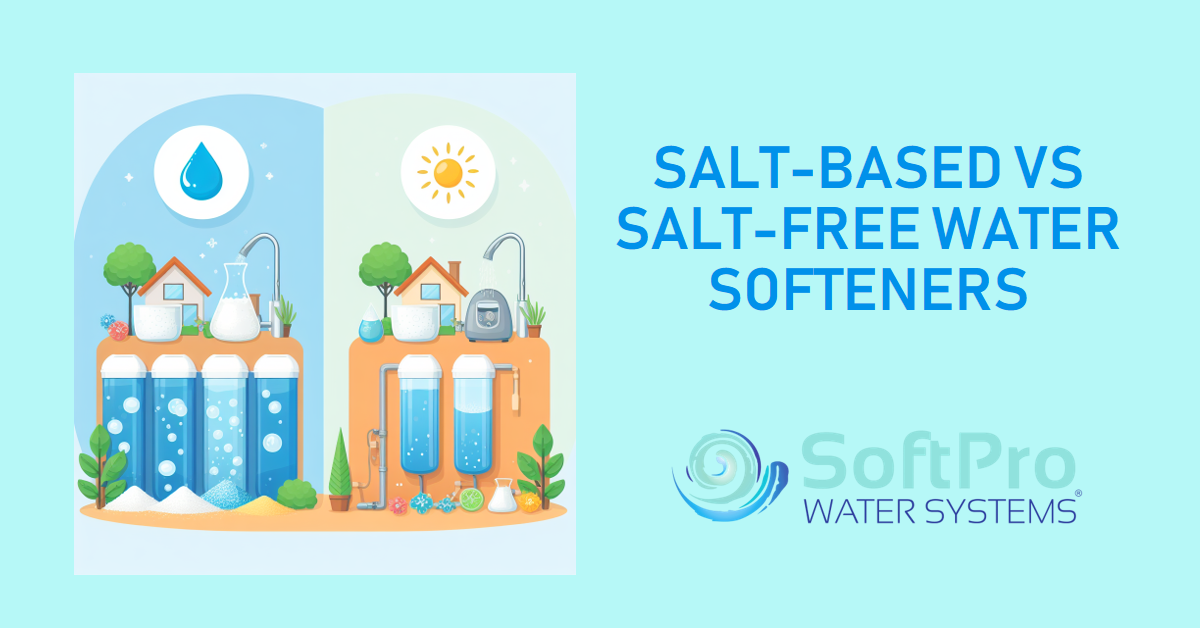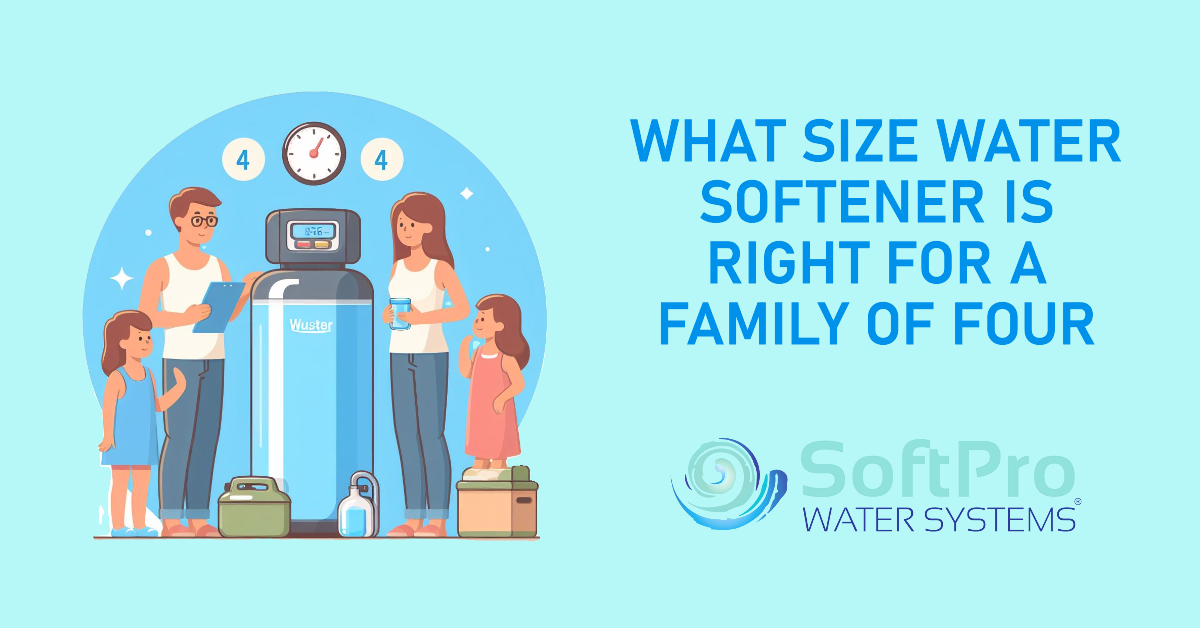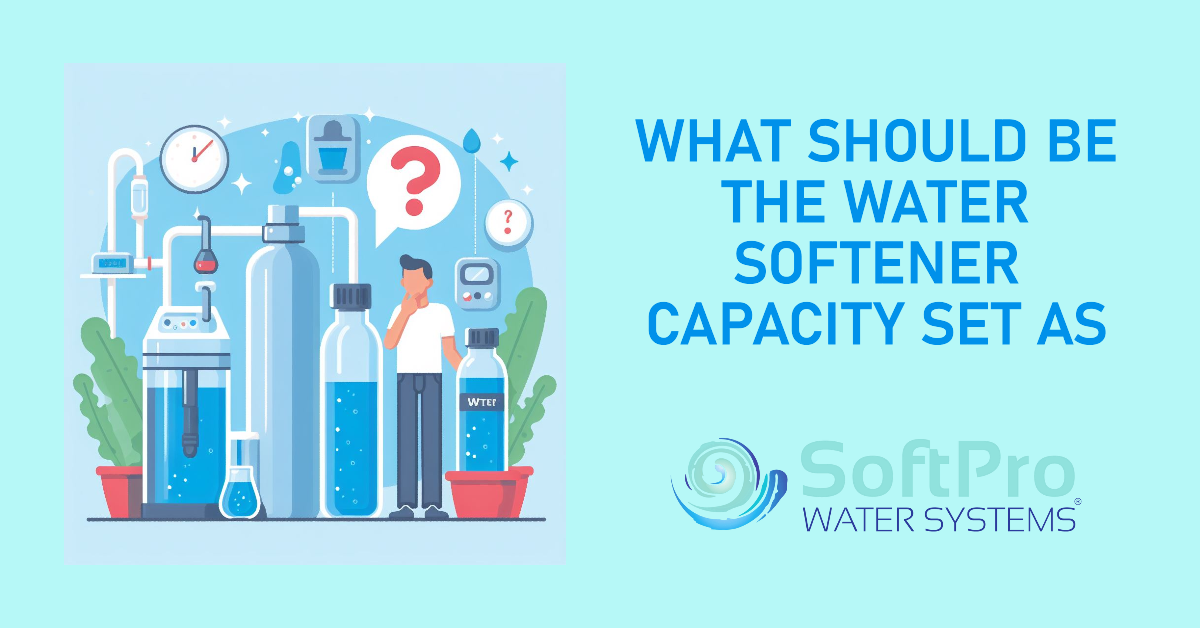Salt-Based vs Salt-Free Water Softeners: Best Solution for Hard Water Problems
Table of Contents
Understanding Hard Water and Water Softening
What is Hard Water?
Hard water is water with a high mineral content, primarily calcium and magnesium. These minerals can cause numerous problems in your home, including:
- Scale buildup: Hard water minerals leave behind a chalky residue on fixtures, appliances, and inside pipes, reducing their efficiency and lifespan.
- Soap scum: Soap doesn't lather as effectively in hard water, leaving behind a film and requiring more soap for cleaning.
- Faded fabrics: Hard water can dull the colors of your clothes and towels over time.
- Dry skin and hair: Hard water can strip natural oils from your skin and hair, leaving them feeling dry and irritated.
According to the United States Geological Survey (USGS), around 85% of American households have hard water to some degree, with the severity varying by location.
How Do Water Softeners Work?
Water softeners remove hardness minerals from your water through a process called ion exchange. In a salt-based softener, this process involves:
- Resin bed: Hard water passes through a tank containing a bed of resin beads coated with sodium ions.
- Ion exchange: Calcium and magnesium ions from the water "stick" to the resin beads, while sodium ions are released into the water, making it softer.
- Regeneration: Once the resin beads become saturated with hardness minerals, the softener undergoes a regeneration cycle. This involves flushing the tank with a brine solution (saltwater), which removes the hardness minerals from the resin and allows it to be reused.
Salt-free water softeners, on the other hand, use a different technology called template assisted crystallization (TAC). This process involves:
- Template media: Hard water passes through a tank containing a special media that attracts and binds hardness minerals into microscopic crystals.
- Crystallization: These crystals remain suspended in the water but are too small to cause scale buildup or other problems.
- Flushing: The softener periodically flushes the tank to remove the accumulated crystal buildup and maintain its effectiveness.
Head-to-Head Comparison: Salt-Based vs Salt-Free Water Softeners
Effectiveness in Water Softening
Salt-based water softeners generally outperform salt-free options in terms of removing hardness minerals. Studies by independent organizations like the Water Quality & Health Council (WQHC) show that salt-based softeners can reduce hardness by up to 99%, while salt-free systems typically achieve a 50-70% reduction. This means salt-based softeners are more effective at preventing scale buildup, soap scum, and other hard water problems.
However, the effectiveness of both types of softeners depends on several factors, including:
- Initial water hardness: Salt-free softeners may be sufficient for mildly hard water, but salt-based systems are necessary for moderate to very hard water.
- Flow rate: Lower flow rates allow for more efficient contact between water and the softening media in both types of systems.
- Maintenance: Regular regeneration for salt-based softeners and media cleaning for salt-free systems are crucial for optimal performance.
Pros and Cons of Each Type
Salt-Based Water Softeners
Pros:
- Highly effective: Salt-based softeners excel at removing hardness minerals, significantly reducing scale buildup, soap scum, and other hard water issues. Research by the Water Quality & Health Council (WQHC) indicates up to 99% hardness reduction compared to 50-70% for salt-free options.
- Protects appliances: Softened water extends the lifespan of washing machines, dishwashers, and water heaters by preventing scale buildup that can damage internal components. A study by the Association of Home Appliance Manufacturers (AHAM) found softened water can increase appliance lifespan by 30%.
- Improves cleaning: Softened water allows detergents and soaps to lather more effectively, leading to cleaner dishes, clothes, and surfaces. This can also reduce the amount of detergent needed.
- No scale buildup: Consistent softening eliminates the chalky residue that can clog pipes, faucets, and showerheads, improving water flow and pressure.
Cons:
- Requires salt refill: Salt-based softeners need regular refilling of the brine solution used for regeneration, adding an ongoing cost and maintenance task.
- Wastewater generation: The regeneration process produces wastewater containing salt and minerals, which requires proper disposal or treatment based on local regulations.
- Adds sodium to water: While generally negligible for healthy individuals, softened water does have slightly elevated sodium levels. This may be a concern for people on sodium-restricted diets.
- Higher maintenance: Salt-based softeners require periodic maintenance, including checking salt levels, cleaning the brine tank, and monitoring regeneration cycles.
Salt-Free Water Softeners
Pros:
- No salt or wastewater: Salt-free softeners eliminate the need for salt refills and wastewater disposal, making them environmentally friendly and potentially reducing maintenance costs.
- No added sodium: Softened water retains its original sodium content, making it suitable for individuals on sodium-restricted diets.
- Lower maintenance: Salt-free softeners generally require less maintenance than salt-based systems, often only needing occasional media cleaning or replacement.
- Simpler installation: Some salt-free softeners are easier to install than salt-based models, potentially appealing to DIY enthusiasts.
Cons:
- Less effective: Salt-free softeners generally achieve lower hardness reduction compared to salt-based systems, potentially leaving some scale buildup and hard water issues.
- May not be suitable for all water: Salt-free systems may not be effective for very hard water or water with high iron content.
- Crystal maintenance: Some salt-free softeners require periodic flushing to remove accumulated crystal buildup, which can be messy and inconvenient.
- Higher upfront cost: Salt-free softeners can have a higher initial purchase cost compared to some salt-based models.
Suitability for Different Needs
Water Hardness Levels
Matching the right softener type to your water hardness level is crucial for optimal performance. Here's a general guideline:
- Mildly hard water (75-125 ppm): Salt-free softeners can be sufficient, potentially achieving 50-60% hardness reduction.
- Moderately hard water (125-250 ppm): Both salt-based and salt-free options can work, but salt-based systems offer better effectiveness (up to 99% reduction) and long-term protection against scale buildup.
- Very hard water (250+ ppm): Salt-based softeners are the clear choice, providing superior hardness removal and preventing significant scale issues.
Remember, these are general recommendations. It's always advisable to have your water tested to determine its exact hardness level and consult a water treatment professional for the most suitable softener solution.
Dietary Restrictions
For individuals on sodium-restricted diets, salt-free softeners are the preferred option as they retain the original sodium content of the water. This eliminates the concern of adding extra sodium through softened water, which can be beneficial for those managing health conditions like hypertension.
Specific Water Concerns
Beyond general hardness, certain water quality issues might influence your softener choice:
- Iron presence: If your water has high iron content, a salt-based softener with an iron filtration system might be necessary. Some salt-free softeners can handle mild iron, but their effectiveness is limited.
- Well water: Well water often has varying mineral composition and potential contaminants. Consulting a water treatment specialist is crucial for selecting the appropriate softener and potentially additional filtration systems for well water applications.
Cost and Maintenance Considerations
Initial Purchase and Installation Costs
The upfront cost of water softeners varies depending on the type, size, brand, and features. Generally:
- Salt-based softeners: Tend to have a lower initial purchase price, particularly for basic models.
- Salt-free softeners: Can have a higher upfront cost, especially for whole-house systems with advanced features.
However, installation costs can factor in as well:
- Salt-based softeners: Usually require professional installation due to plumbing connections and brine tank setup.
- Salt-free softeners: Some models, especially point-of-use options, offer DIY installation for cost savings.
The initial cost comparison might not be decisive, as long-term factors like maintenance and operational expenses also play a significant role.
Ongoing Maintenance Expenses
The ongoing costs of water softeners differ based on their type:
-
Salt-based softeners:
- Require regular salt purchases, with annual costs varying depending on water usage and softener size.
- May have wastewater disposal fees in some regions.
- Periodic maintenance tasks like cleaning the brine tank and checking salt levels add to the cost.
-
Salt-free softeners:
- Do not require salt purchases or generate wastewater, potentially saving on long-term expenses.
- May need occasional media cleaning or replacement, depending on the model and water quality.
- Generally require less maintenance compared to salt-based systems.
While salt-free softeners might have a higher initial cost, their lower maintenance requirements can lead to cost savings over time, especially for high water usage situations.
Potential Savings from Water Softening
While water softeners involve upfront and ongoing costs, they can also offer potential savings in several areas:
- Reduced detergent use: Softened water allows detergents and soaps to lather more effectively, potentially leading to using less product.
- Improved appliance efficiency: Scale buildup in appliances can decrease their energy efficiency. Softened water prevents this, potentially saving on energy costs.
- Extended appliance lifespan: Scale buildup can damage appliances and shorten their lifespan. Softened water helps protect appliances, potentially reducing replacement costs.
These potential savings can offset the costs associated with water softeners, making them a worthwhile investment for many households.
Environmental Considerations
Salt Usage and Wastewater
One key environmental factor to consider when choosing a water softener is its impact on salt usage and wastewater generation:
-
Salt-based softeners:
- Utilize salt for regeneration, contributing to salt mining and potential environmental concerns around brine production and disposal.
- Generate wastewater containing salt and minerals, which requires proper disposal or treatment based on local regulations.
-
Salt-free softeners:
- Eliminate the need for salt and associated environmental impacts.
- Do not produce wastewater, making them a potentially eco-friendly option.
If minimizing environmental impact is a priority, salt-free softeners offer a clear advantage, especially in regions with strict wastewater disposal regulations.
Energy Consumption
Both salt-based and salt-free softeners consume energy during operation. However, factors like:
- Softener efficiency: Newer models of both types tend to be more energy-efficient.
- Water usage: Higher water usage generally leads to increased energy consumption for any softener type.
- Regeneration frequency: Salt-based softeners with optimized regeneration cycles can minimize energy use.
The energy consumption difference between the two types is often negligible compared to other household appliances.
Sustainable Choices
When considering the environmental footprint of water softeners, additional factors can contribute to a more sustainable choice:
- Choosing a softener with certifications: Look for models with certifications like WaterSense, which indicate efficiency and water conservation.
- Proper maintenance: Regular maintenance ensures optimal performance and minimizes resource usage.
- Responsible disposal: For salt-based softeners, follow local regulations for proper brine disposal to minimize environmental impact.
Choosing the Right Water Softener for You
Choosing between salt-based and salt-free water softeners can feel like navigating a labyrinth of benefits and drawbacks. Ultimately, the optimal path depends on your unique water woes and lifestyle priorities.
For tackling severe hard water and preventing crippling scale buildup, salt-based softeners reign supreme. Their ion-exchange prowess delivers up to 99% hardness reduction, safeguarding appliances, boosting cleaning efficacy, and leaving skin and hair feeling luxuriously soft. However, the trade-off comes in the form of ongoing salt purchases, wastewater generation, and slightly higher maintenance demands.
Salt-free softeners, on the other hand, shine in their environmental consciousness and low-maintenance appeal. They eliminate salt usage and wastewater concerns, potentially aligning with eco-friendly values. Additionally, their simpler technology often translates to easier upkeep. However, their effectiveness plateaus at around 50-70% hardness reduction, potentially leaving some hard water issues lingering, especially for homes grappling with extreme water hardness.
Key Takeaways
- Water hardness reigns supreme: Assess your water hardness level to determine the necessary level of softening power.
- Budgeting for benefits: Consider upfront costs, ongoing maintenance expenses, and potential cost savings from improved appliance efficiency and reduced detergent use.
- Maintenance matters: Weigh your comfort level with regular salt refills and cleaning tasks for salt-based systems.
- Environmental ethos: Prioritize salt-free options if minimizing environmental impact is a key concern.
- Seek expert guidance: Consulting a water treatment professional can unravel the complexities and pinpoint the ideal softener solution for your specific needs.
Remember, there's no one-size-fits-all solution. By carefully weighing your priorities and seeking expert advice if needed, you can confidently conquer the hard water challenge and unlock a cascade of benefits for your home and well-being.






![SoftPro Chlorine+ Carbon Whole House Water Filter to Remove PFAS, Chlorine, Chloramine & Pesticides [City Water Filters Series]](http://www.softprowatersystems.com/cdn/shop/files/SoftPro_Whole_House_Carbon_Filter_Chlorine.webp?v=1769127507&width=140)
![SoftPro Iron Filter - Iron Master AIO - Best Iron Filter for Well Water [Air Injected Water Filter / Katalox]](http://www.softprowatersystems.com/cdn/shop/files/SoftPro_AIO_Iron_Master_-_Best_Whole_House_Iron_Filter_1b6d98eb-a7f7-4749-9306-7333a15685e9.webp?v=1769125508&width=140)













